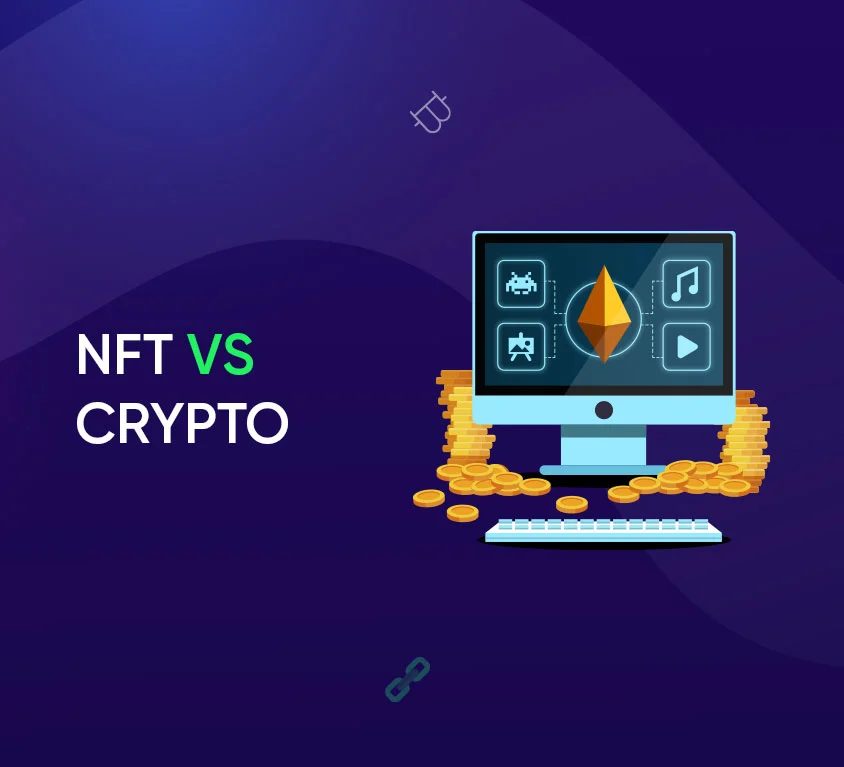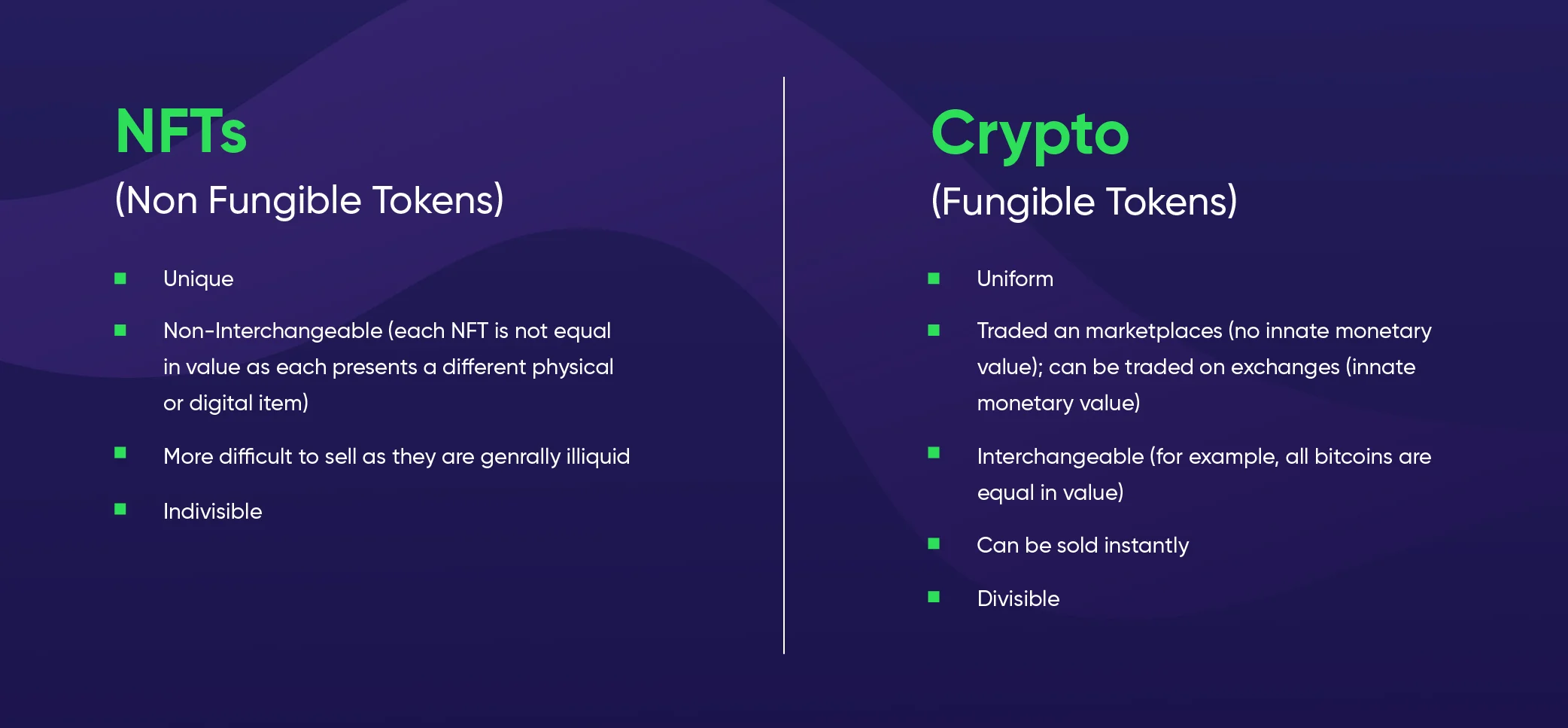
Introduction
Web3 & Blockchain Consultancy :
NFT vs Crypto: What is The Difference Between NFT and Crypto?
The phrases “NFT” and “crypto” have grown increasingly prevalent in the fast-expanding environment of digital assets. Although these terms are frequently used interchangeably, they reflect separate concepts in the context of blockchain technology and digital ownership. We go into the subtle differences between NFTs and cryptocurrencies in this detailed article, throwing light on their distinct properties, applications, and ramifications. NFTs vs crypto tokens have gained a lot of interest in the financial and artistic worlds in recent years. They are a significant sort of data transaction on the blockchain network. A single NFT can fetch roughly $70 million, whereas Bitcoin, the popular cryptocurrency, pioneered the concept of investing in digital tokens. This is the effect of NFTs and cryptos. While the two digital assets have certain similarities, they also differ in important ways. Continue reading to learn about the key relationships between non-fungible tokens and cryptos.Understanding the Differences Between NFT vs Crypto
The phrases “NFT” and “crypto” have grown increasingly prevalent in the fast-expanding environment of digital assets. Although these terms are frequently used interchangeably, they reflect separate concepts in the context of blockchain technology and digital ownership. We go into the subtle differences between NFTs and cryptocurrencies in this detailed article, throwing light on their distinct properties, applications, and ramifications.What is NFT?
NFT, or Non-Fungible Token, is a phrase that has exploded in popularity in recent years, particularly in the art and antiques markets. Unlike fungible cryptocurrencies such as Bitcoin or Ethereum, which can be exchanged one-to-one, NFTs are different digital assets that cannot be directly exchanged on a like-for-like basis due to their inherent uniqueness. NFTs are primarily based on blockchain technology, with smart contracts being used to create ownership, provenance, and scarcity. Because this technique ensures that each NFT is unique and cannot be reproduced or replaced, they are suitable for reflecting digital ownership of objects such as artwork, music, virtual real estate, and more.What are Cryptocurrencies?
Cryptos, also known as crypto tokens, are a sort of digital asset that is built over a network that spans several computers. They are recorded in the blockchain database and have a decentralized structure. The fact that cryptos are often not issued by any central authority renders them theoretically impervious to central authority manipulation and reduces the risk of counterfeiting. Bitcoin and Ethereum are currently the most popular cryptos on the market. While various cryptocurrencies have emerged, they are rarely used for retail purchases. However, the popularity of cryptocurrency as a trading and investment instrument is attributable to its value. They are also used for international transfers, albeit in a limited capacity. Cryptocurrencies, like fiat currency, are fungible.NFT vs Crypto
In the world of digital assets, there is a distinction between “Cryptos” and “NFTs,” each with its own particular mantle inside the realm of blockchain technology. Cryptos, or cryptocurrencies, are digitized mediums of exchange that are supported by cryptographic protocols that ensure secure transactions and create decentralized financial ecosystems. These currencies, such as Bitcoin and Ethereum, transcend geographical boundaries and traditional financial institutions, promoting a world of decentralized economic agency. NFTs, or Non-Fungible Tokens, are a different breed of digital asset, renowned for their capacity to contain uniqueness and provenance within the digital environment. Unlike Cryptos, NFTs are indivisible and non-interchangeable, endowed with metadata that gives them unique characteristics. Here are some points which show the difference between NFT and crypto to understand it more clearly.
-
Defining the Environment: Cryptocurrencies
Cryptocurrencies, sometimes known as “Cryptos,” represent a paradigm shift in the world of financial transactions. Built on secure cryptographic protocols, these digital currencies transcend traditional geographic and legal constraints, providing a decentralized alternative to existing monetary systems. The fungibility of Cryptos—their ability to be exchanged one-to-one—is their distinguishing feature. Cryptocurrencies such as Bitcoin and Ethereum work as mediums of exchange and value storage, enabling peer-to-peer transactions without the use of intermediaries.
-
Non-Fungible Tokens (NFTs): Digital Imprints of Individuality
Non-Fungible Tokens (NFTs) embrace the concept of uniqueness inside the digital environment, in stark contrast to the interchangeable nature of Cryptos. NFTs, each loaded with unique metadata, function as cryptographic certificates of ownership for unique digital assets. These assets are divided into several categories, including digital art, virtual real estate, collectibles, music, and others. Because NFTs are non-transferable, each token is unique, encapsulating the essence of rarity and provenance.
-
The Primary Distinction Between Fungibility and Uniqueness
The idea of fungibility versus uniqueness is at the heart of the difference between Cryptos and NFTs. Cryptocurrencies, such as Bitcoin and Litecoin, have the virtue of fungibility, which means that each unit is replaceable with another of the same denomination. This consistency allows for frictionless transactions and widespread adoption as a means of trade. NFTs, on the other hand, live on their uniqueness, as reflected by tokens on platforms such as Ethereum’s ERC-721 standard. Because no two NFTs are alike, they are ideal for symbolizing digital scarcity and ownership.
-
Creative Ownership vs. Financial Utility
Cryptocurrencies shine as financial tools, allowing for borderless transactions, inflation hedges, and investment opportunities. While cryptocurrency volatility poses hazards, it also provides opportunities for significant gains. NFTs, on the other hand, go beyond the financial arena, ushering in a new era of ownership and innovation. Artists, musicians, and content creators can use NFTs to tokenize their work, offering them exclusive ownership rights and a new revenue source via royalties.
-
NFTs in Gaming and Virtual Real Estate
Gaming and virtual real estate are two more thriving industries for NFTs. NFTs are being used in blockchain-based games and virtual worlds to produce unique in-game assets and virtual real estate properties that users can own, trade, and monetize. You may tokenize and commercialize your unique digital creations by using NFT development services, reaching a global audience of art collectors and lovers.